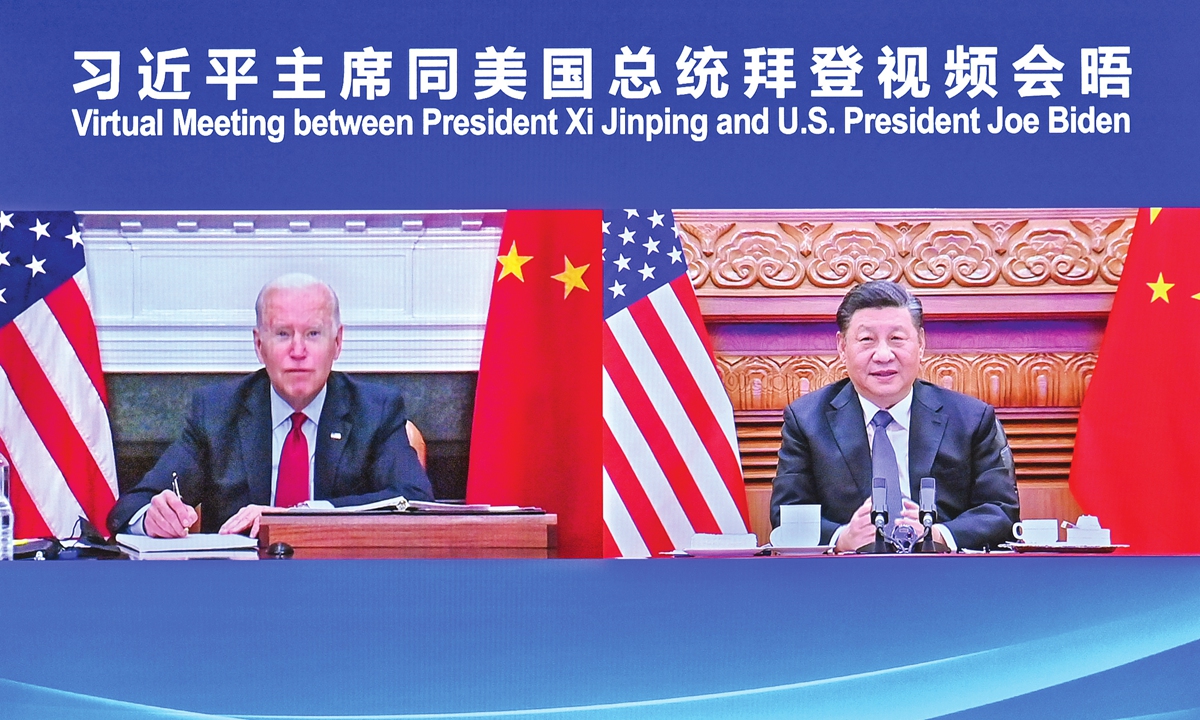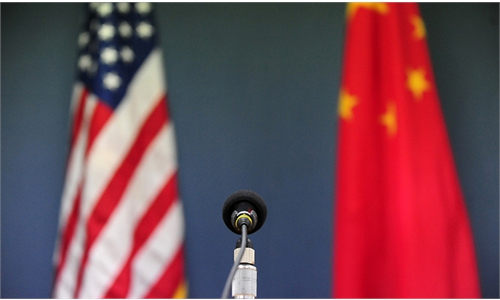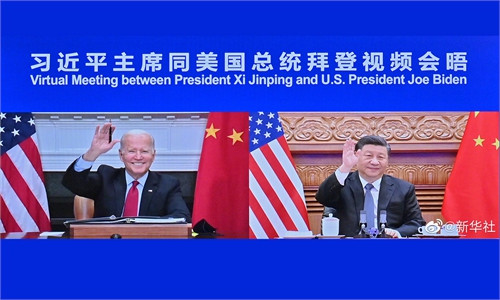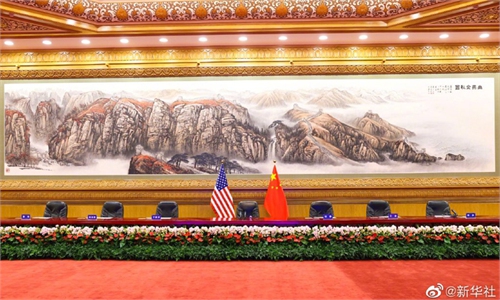World sees China-US interactions as equal, fair
A changed diplomacy toward Washington decided by Beijing’s strength

Chinese President Xi Jinping meets with US President Joe Biden via video link, in Beijing, capital of China, on November 16, 2021. Photo: Xinhua
"A signal for modest hope," "a cooling down of hostilities," a highlight of "neither non resolution nor major breakthroughs"… When major US media with different political leanings interpreted the most important interaction between the top leaders of the world's two major powers, there were mixed messages. Still, a major tone was that the two leaders communicated directly with each other in a respectful and cordial manner.
When some foreign experts told the US media that "it's a different China now" as the US "playing hard line" policy does not appear to have worked out in wrestling with China, Chinese experts attributed such fundamental changes in the way China interacts with the US on the basis of equality and fairness, a new form of Chinese diplomacy shaped from a "position of strength."
Still, officials from the current administration, including US President Joe Biden himself, chose to play a word game in the face of domestic political pressure. For some American hawks and political elites, it is difficult for them to accept a different China with whom they need to deal on an equal footing, but they have to do so as they have no choice but to work with China to tackle domestic and international challenges, experts said.
An equal footing
In a CNN story headlined "Beijing has already claimed victory," the US media described the venues where the virtual summit between Chinese President Xi Jinping and US President Joe Biden was held, saying that Xi "sat meters away in a row on the other side of the room," which is a markedly different setup from the US officials who sat in the Roosevelt Room of the White House.
Citing a foreign expert, CNN said Biden accepted to talk to China on an equal footing, which gives the country a lot of status - great power status.
A New York Times story also highlighted the willingness of the two leaders to "manage their differences in a way that avoided conflict between the world's two largest powers," although the newspaper, like some other US media, claimed there were no major breakthroughs from the summit, echoing rising criticism against Biden in the US.
In a tone criticizing Biden's softer-than-expected posture, US conservative media Fox News pinpointed issues about human rights, the origins of COVID-19 and the Winter Olympic Games in the headline of a story on Wednesday, blaming the US President for not raising those topics at the summit. In an apparent sour grapes attitude, some questioned the way Xi and Biden greeted each other, casting doubt over such cordial interactions between the two leaders.
Some observers believe that China has gained an edge in the latest interaction with the US, as American hawks, including Trump-era politicians like former anti-China figure Peter Navarro called it a "Biden surrender."
A strong leadership, China's overall development, the country's resolute and effective response to the COVID-19 epidemic, climate change and other aspects gave China the edge at the summit, Shen Yi, a professor at the School of International Relations and Public Affairs of Fudan University, told the Global Times on Wednesday.
"My impression of the summit is that bearing a bigger picture in mind, China came up with a series of important proposals for the China-US relationship in a constructive way, standing on the side of the international community with a shared future," he said.
It was a meeting of two equally strong world leaders and the American president did not even try to speak from the "position of strength," Yuri Tavrovsky, head of the Expert Council of the Russian-Chinese Committee for Friendship, Peace and Development, told the Global Times on Tuesday.
"The highlight was Biden's agreement with the Chinese official position on Taiwan," the Russian expert said.
Mainstream US media outlets played down Biden's words on the Taiwan question at the summit, after Xi warned the US not to play with fire on the matter, as some carefully compared the subtle differences between the readouts from the Chinese government and the White House.
Some Chinese experts consider the tactic of playing a word game on the Taiwan question is another typical posture of US politicians who yield to domestic political pressure with ambiguity and flip-flops on rhetoric.
"There's no need at all to analyze Biden's meaning word by word," Lü Xiang, a research fellow at the Chinese Academy of Social Sciences, told the Global Times on Wednesday. "It is known that Biden is poor in verbal expression. Since taking office, he has uttered all sorts of strange words and expressions. Another confusing and unclear statement is not surprising," he said, noting that it's also a way of "performing tai chi" with the US media.
Within the White House, there are divergences on the outcome of the summit, for example, some media reported on Wednesday that the Biden administration is planning a diplomatic boycott of the Beijing Winter Olympic Games in 2022, and Jake Sullivan, the US national security adviser, said that Biden raised "human rights abuse" issues at the summit.
"An anti-Chinese mindset is typical for the entire American political class both within and outside the administration, both Democrats and Republicans," Tavrovsky said, noting that diehard neoconservatives like former officials Bill and Hillary Clinton and Blinken are influencing Biden and major policy-making mechanisms of his administration.
The containment strategy started before Biden and even before former president Donald Trump, and now is in the process of accelerating on the military, trade and ideology tracks, the Russian expert added.
New hope
In spite of domestic political pressure, the virtual meeting is widely seen as a good starting point to reset the China-US relationship amid a downward spiral. Though some US media outlets claimed there were no major breakthroughs nor consensus from the meeting, experts said that breaking the deadlock in the bilateral relationship is a fruitful result, with concrete progress on major aspects such as diplomacy, climate and trade.
As well as reportedly agreeing to hold talks on nuclear arsenals which Chinese Foreign Ministry said Wednesday they have no information to offer apart from the virtual meeting's readout, the US and China have already reached a consensus on establishing a working group on enhancing climate action and they also agreed to relax restrictions on journalist visas on Tuesday.
On climate change, experts noted there are deeper areas for the two countries to work together.
"The US could work with China to build up its green infrastructure, which remains sorely inadequate, it could develop closer trade links with China on renewable energy technology, or it could work with China's Belt and Road Initiative to build climate resilience around Asia and Africa," Singaporean political scientist Kishore Mahbubani told the Global Times in a recent interview.
Compared to suspicious voices from some US media outlets on the outcome of the summit, US business groups overwhelmingly welcomed an agreement on upgrading a fast-track arrangement to help streamline US business travel to China. Some also expressed their hope for other meetings to be organized to discuss economic and trade issues, including tariff reductions.
"Concerning the call to reduce tariffs on Chinese goods, those tariffs that hurt American consumers, such as those imposed on imported daily necessities, may be reduced," said Xiao He, an expert from the Institute of World Economics and Politics at the Chinese Academy of Social Science, on Wednesday.
But those imposed on products like semiconductors are not expected to be lifted, so the overall structure of tariffs would change, Xiao said.
China's increasing strength has been pushing the US to treat China in an equal and fair manner, which is the future trend, Li Haidong, professor at the Institute of International Relations at China Foreign Affairs University, told the Global Times on Wednesday.
However, the US' traditional posture of suppressing others from a position of strength would make it hard to accept an equal coexistence with China, the expert said, urging the Biden administration to focus on the correct track and abandon political rhetoric when it comes to keeping communication channels open with China in a rational way.
"It's time for the US to learn from China, which is focusing on its own development to win the race, rather than containing others' progress in order to show that it's not stuck in recession," Li said.






